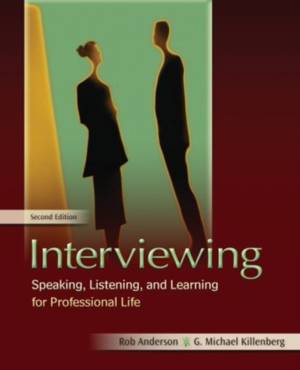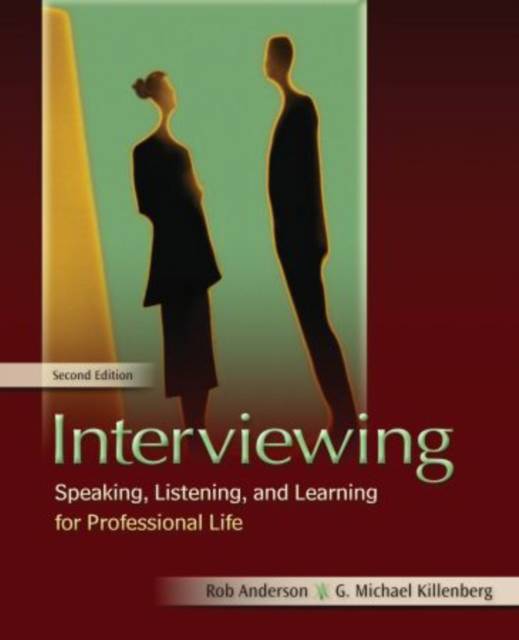
- Afhalen na 1 uur in een winkel met voorraad
- Gratis thuislevering in België vanaf € 30
- Ruim aanbod met 7 miljoen producten
- Afhalen na 1 uur in een winkel met voorraad
- Gratis thuislevering in België vanaf € 30
- Ruim aanbod met 7 miljoen producten
Zoeken
Interviewing
Speaking, Listening, and Learning for Professional Life
Rob Anderson, G Michael Killenberg
Paperback | Engels
€ 291,95
+ 583 punten
Omschrijving
In the second edition of Interviewing, experienced educators Rob Anderson and G. Michael Killenberg explain and demystify the interviewing process, offering students a practical guide to the fascinating art of asking and answering questions. Throughout, they urge students not to view interviewing as a procedure or as a collection of techniques; instead, they present the process of interviewing as a fascinating opportunity for learning through dialogue. The basic motivation for interviewing is learning something new. Each chapter features two sections: "The Basics," which describes essential skills, and "Beyond the Basics," which places them into a relevant context. Moreover, interviewing skills are clearly divided into three interrelated types: Listening, Questioning, and Framing. To highlight the practical, real-world significance of interviewing, the authors encourage students to apply their learning actively and to connect their skills with ideas from other communication, social science, and humanities courses. This student-friendly text also includes the following features:
* An emphasis on how interviewing contributes to the quality of public dialogue
* An integrated approach to both interviewer and interviewee roles
* In-depth coverage of culture and ethics
* Innovative boxed supplements, including:
- "Interviewers/Interviewees in Action" boxes, featuring first-person accounts
- "Trying Out Your Skills" boxes
- End-of-chapter "Making Your Decision" boxes, which present interactive hypothetical situations designed to generate class discussion In addition, each chapter includes "The Interview Bookshelf," an annotated section recommending books that students will find helpful for further reading or for future interviewing-related assignments in other classes. A comprehensive online Instructor's Resource Guide is also available and provides suggestions for class activities, resources, and assignments.
* An emphasis on how interviewing contributes to the quality of public dialogue
* An integrated approach to both interviewer and interviewee roles
* In-depth coverage of culture and ethics
* Innovative boxed supplements, including:
- "Interviewers/Interviewees in Action" boxes, featuring first-person accounts
- "Trying Out Your Skills" boxes
- End-of-chapter "Making Your Decision" boxes, which present interactive hypothetical situations designed to generate class discussion In addition, each chapter includes "The Interview Bookshelf," an annotated section recommending books that students will find helpful for further reading or for future interviewing-related assignments in other classes. A comprehensive online Instructor's Resource Guide is also available and provides suggestions for class activities, resources, and assignments.
Specificaties
Betrokkenen
- Auteur(s):
- Uitgeverij:
Inhoud
- Aantal bladzijden:
- 416
- Taal:
- Engels
Eigenschappen
- Productcode (EAN):
- 9780195367713
- Verschijningsdatum:
- 23/07/2008
- Uitvoering:
- Paperback
- Formaat:
- Trade paperback (VS)
- Afmetingen:
- 190 mm x 231 mm
- Gewicht:
- 635 g

Alleen bij Standaard Boekhandel
+ 583 punten op je klantenkaart van Standaard Boekhandel
Beoordelingen
We publiceren alleen reviews die voldoen aan de voorwaarden voor reviews. Bekijk onze voorwaarden voor reviews.











